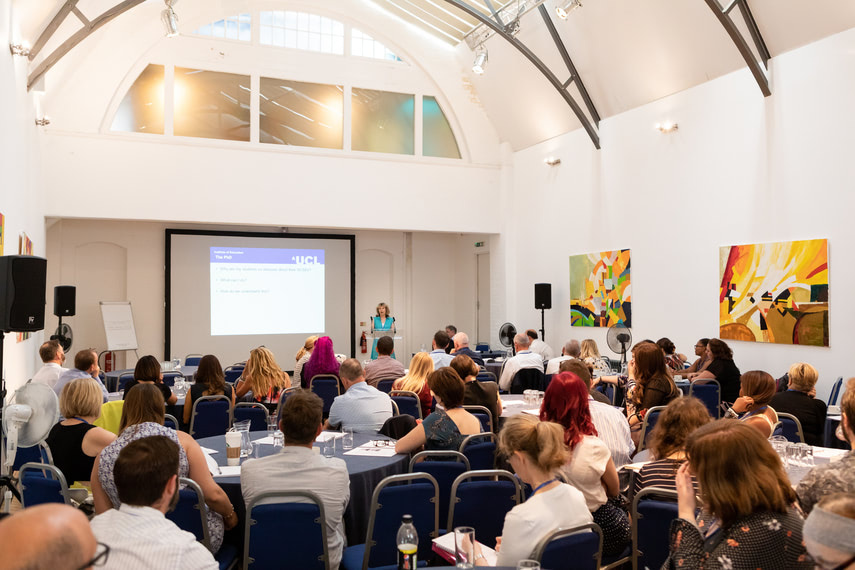ETF launches 2018/19 Masters research opportunities for practitioners at Annual Research Conference

An opportunity for teachers, trainers and education leaders working in the Further Education (FE) and Training sector to work towards a Masters qualification was relaunched yesterday by the Education and Training Foundation (ETF).
Practitioners can now apply to take part in the ETF’s 2018-2019 Practitioner Research Programme, which provides a valuable, funded opportunity for practitioners to carry out research that improves practice in the sector, while gaining a MA or MPhil qualification at the same time
The launch took place at the ETF’s fifth Annual Research Conference 2018 at Mary Ward House in London, where over 45 current participants on the current MA and MPhil research programmes gathered to share research findings they had developed through their own practice in their FE institutions across the country.
They joined the CEO of the ETF, David Russell, and the programme leaders from both the ETF and the University of Sunderland Centre for Excellence in Teacher Training (SUNCETT) – which delivers the programme — for a conference on the theme of Shifting Horizons: Educational Practice, Education Theory and Educational Research.
The Education and Training Foundation (ETF), which has been running the Practitioner Research Programme since 2014, is supporting all the costs of the programme (see below), including three residential development workshops, for the first year. Just a £400 contribution to enrolment and graduation fees is required for the second year. Previous participants have gone on to senior leadership positions and advanced practitioner posts in their colleges.
This year’s programme has seen a significant increase in the prestige and rigour of the programme as it is now 100% accredited, so all participating teachers and practitioners are now working towards an MA or MPhil, focusing on research into challenges and areas for growth within their institutions.
Research presented by practitioners at yesterday’s conference focused on areas included maths and English improvement, the application of critical thinking, innovative uses of ICT, improving inclusion and access, and supporting mental health.
Paul Kessell-Holland, Head of Partnerships at the Education and Training Foundation, said: “One of the key principles underpinning the ETF’s approach is that teacher-led research helps to develop both teaching professionals for the future and an evidence base for all practitioners and leaders to access and learn from. This is why this Practitioner Research Programme has such a crucial role to play in driving forward standards in teaching across the sector.
“I am delighted by the range and quality of research on display today, and with the immense leap forward we have taken as we move to fully accredited research outcomes through MA and MPhil study. The breadth and depth of work being showcased today is good reason for us all to be confident we can succeed.”
Professor, Maggie Gregson, Director of the University of Sunderland Centre for Excellence in Teacher Trainingt, said: “Drawing on our extensive experience and expertise in delivering innovative approaches to supporting practitioner research, the depth of this year’s research shows there is a real desire for talented sector practitioners to improve standards. We are proud to be working with the Education and Training Foundation and practitioners from across the country on this vital strand of research and we are confident we will receive the same level of first class applications as we have done this year.”
The 2018/19 programmes are now open. Applications close on Monday 17 September at 5pm. More information can be found on the ETF’s webpage.
The ETF has identified some priority areas for which it would particularly welcome applications. They include:
- Developing learners’ maths and English abilities, or supporting the improvement of teaching, learning and assessment in these subjects
- Promotion and support for addressing the gender imbalance in the teaching of and uptake and engagement in STEM subjects.
- Working with employers and other partners in the context of Apprenticeships or preparation for T Levels
- Using and evaluating new technologies and online learning and digital technologies
There are currently two qualification routes available:
A one-year MA Module in Educational Research (30 credits), targeted at teachers starting out in research and interested in engaging in small-scale, evidence-based and practice-focused research.
A two-year Masters of Philosophy (MPhil) programme in Educational Research aimed at those seeking to take their research to the next level, specifically designed for practitioners with some experience in research.
In summary, successful applicants will:
- Attend three residential research development events
- Be allocated a research mentor to support them
- Attract an ETF bursary payable to your employer (amount to be confirmed, in 2017/18 these were £1,500 for practitioners on the MPhil Programme and £1000 for practitioners on the MA Short Course.) ETF Bursaries are intended to help employers contribute to the costs of providing remission time to engage in research; travel costs to and from residential Research Development Workshops, the costs of attending the ETF Annual Research Conference, costs of any overnight accommodation necessary to attend the ETF Conference etc).
Find out more











Responses